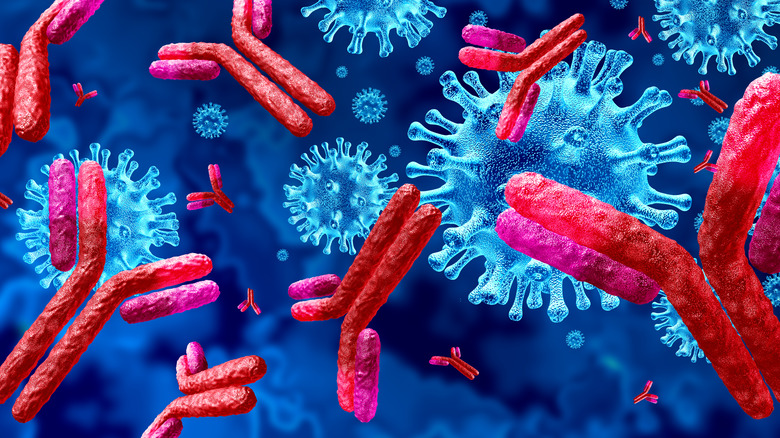When You Smoke Marijuana Every Day, This Is What Happens To Your Immune System
The percentage of people who smoke marijuana in the U.S. has increased over the last decade, reaching all-time highs in 2022, per a Monitoring the Future (MTF) panel report. Consequently, it's not hard to understand why there's a burgeoning interest in what happens to your body when you smoke marijuana every day. From euphoric sensations, lowered inhibitions, and pain relief to foggy memory, impaired motor skills, and mental health concerns, the list contains impacts on both sides of the coin.
Your immune system, your first defense against protecting you against disease, can also be impacted by regular marijuana use. According to a 2021 study published in the journal Viruses, cannabis use was linked with impairing immune system function. This leaves people vulnerable to human immunodeficiency virus (HIV) and hepatitis C infection (HCV).
However, the science pertaining to how marijuana use could impact your immune system is nuanced, to say the least. How it affects you might depend on your particular immune system and how it's functioning. Going back to immune system suppression though, let's see how that happens.
How does marijuana use suppress your immunity?
Experts have a few theories. According to Prakash Nagarkatti, a microbiology and pathology professor at the University of South Carolina who's done research on the topic, "the key to this suppression is a unique type of immune cell" called myeloid-derived suppressor cells or MDSCs (via Science Daily). An increased level of MDSCs is thought to be present in people with cancer, but unlike other immune cells, MDSCs suppress the immune system. "MDSCs seem to be unique and important cells that may be triggered by inappropriate production of certain growth factors by cancer cells or other chemical agents such as cannabinoids, which lead to a suppression of the immune system's response," explained Nagarkatti.
Per an older study published in The Journal of Immunology, also authored by Nagarkatti, it was the pain-relieving and main psychoactive compound found in cannabis — tetrahydrocannabinol otherwise known as THC — that suppressed the anti-tumor immune response. Interestingly, a 2023 study published in the journal Nature Communications found that THC was linked with negatively impacting brain immune cells as well, making teenagers more genetically predisposed to schizophrenia. This brings to light the question of whether or not marijuana can increase your risk of developing psychiatric disorders. Back to the topic of immunity, however, there is another side to this coin — cannabis as an autoimmune suppressor for people who might benefit from it.
Marijuana's potential to treat autoimmune health conditions
Your immunity is a complicated thing. While some people's immune systems work as they ought to, others' end up attacking them and causing disease. Enter autoimmune conditions like lupus, rheumatoid arthritis, inflammatory bowel disease (IBD), and multiple sclerosis (MS).
As explained by board certified neurologist Daniel P. Stein (via Neurology of Cannabis), cannabis therapy can be a meaningful route to take for people with immune disorders. "Multiple sclerosis, for example, one of those conditions where the underlying immune system results in attack of the nerve cell, myelin sheath and death of nerve cells can at least theoretically be reduced by quieting down the immune system using plant medicine — phytocannabinoids, medical cannabis," explained the expert.
A 2020 study published in Cannabis and Cannabinoid Research seems to support this. Both natural and synthetic cannabinoids were found to be effective in suppressing the inflammatory response triggered by the immune system in a 2021 study pertaining autoimmune disorders, also published in Cannabis and Cannabinoid Research. There is even a theory that cannabidiol or CBD — the non psychoactive compound in marijuana — can act as an immunomodulator (either increase or decrease your immune system response). However, more data is needed on this claim. Speaking of more data, it is safe to say that marijuana-related studies still have a long way to go. Until then, it might be best to stick with what we do know, like what happens to your memory when you smoke marijuana every day.



